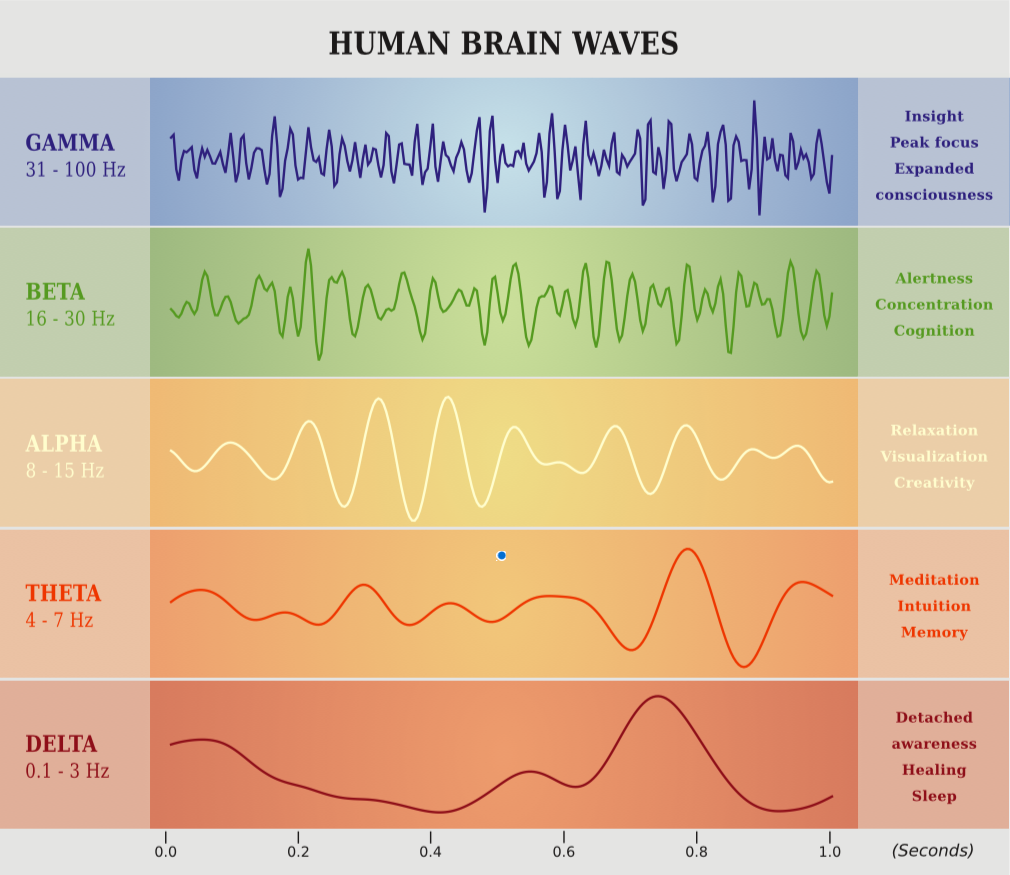Have you ever wondered what happens to your mind and body whilst meditating? The practice of meditation and mindfulness training has been around for centuries and is known for its numerous benefits, namely stress reduction and increased focus. But what exactly goes on inside the brain during meditation? Can consistent bouts of meditation really improve our mindset and therefore quality of life?
In this blog, we dive deeper into the benefits of meditation and look at the changes that take place at a physiological level.
WHY SHOULD WE MEDITATE?
In our fast paced busy world, it is becoming increasingly apparent that we, as humans, need time to slow down and recharge. We are not designed to be in a constant state of flight or fight and too much of this increased stress is quite simply exhausting for our mind and physical body. Prolonged stress can trigger a chain reaction of physical side effects like increased heart rate, increased blood pressure, anxiety, symptoms of depression, headaches and migraines, sleeplessness, chronic gastritis and illness.
So how do we slow it all down? How do we combat feelings of overwhelm? How do we manage stress long term?
One of the simplest ways to reduce this fight or flight response is through breathing techniques and meditation. Although the yogis and monks have been practicing meditation for thousands of years, it is only relatively recently that science has begun to study and understand the meditation process at a molecular-level. We are gradually learning how affected molecules are linked to changes in stress responses and mood and the response in the electromagnetic waves of our mind.
HOW DOES MEDITATION REDUCE STRESS?
Consistent meditation practice has been proven to reduce symptoms of chronic stress, evoke calmness and clarity. But what's really going on throughout a meditation experience?
Meditation and mindfulness practice is shown to decrease our stress response by switching which nervous system in our body is activated. In modern life, we are often operating within our sympathetic nervous system, which is our fight or flight response. This can be triggered by significant life events or even everyday situations such as increased workload, screen time, frustration in traffic, financial worries or negative emotions. By meditating and concentrating on our breathing our body naturally shifts into our parasympathetic nervous system, which allows us to rest and relax, telling our body that it is okay to slow down. Meditation can shift our brain waves from a higher frequency to a lower frequency, which helps to change how we feel and also stimulate different parts of our brain such as the vagus nerve that help us to slow down and triggers the rest and restore part of our autonomic nervous system.
WHAT HAPPENS IN THE BRAIN? HOW DOES MEDITATION IMPROVE COGNITIVE FUNCTION & SELF AWARENESS?
A study on mindful meditation looked at outcomes six to twelve months after meditating around 20 minutes a day and observed changes in brain activity, structure and function.
Researchers noticed increases in grey matter density in the hippocampus and other frontal regions of the brain as well as increases in anterior insula and cortical thickness. So what does this mean?
Increases in grey matter and the left hippocampus aid learning, cognition, and memory, resulting in better retention of facts and more mindful behaviour. And increases in the anterior insula and in cortical thickness benefit cognitive function, attention and, self-awareness. There are five types of brain waves, which occur at various frequencies and have different effects on our body and mind which can be influenced by meditation. When we sit to meditate, we will often begin with alpha brain waves and move into a theta state.

HOW DOES MEDITATION MAKE YOU HAPPIER?
Studies show that meditation practice can significantly affect hormones and neurotransmitters such as cortisol, serotonin, melatonin, and epinephrine. Cortisol is also known as our stress hormone and meditation has proven to lower its levels in our body, making us feel more relaxed and aiding in the transition to our parasympathetic nervous system as mentioned above. Findings also show that regular meditation increases serotonin which is sometimes referred to as our rest and fulfilment hormone. The results of a 2015 study showed that the effects of meditation not only increase serotonin levels but also that these levels can remain elevated throughout the day and night, contributing to an overall sense of happiness and contribute to more positive emotions.
HOW DOES MEDITATION CONTRIBUTE TO BETTER FOCUS?
Simple meditation contributes to better focus by helping to calm and quiet the mind. Through the practice of meditation, individuals learn to cultivate a sense of mindfulness and present moment awareness. This allows them to become more aware of their thoughts and distractions, and to let go of them without judgment or attachment. By consistently practicing meditation, individuals develop the ability to redirect their attention back to the present moment and the task at hand, enhancing their ability to concentrate and stay focused for longer periods of time. Additionally, meditation has been found to reduce stress and anxiety, which can often be major contributors to difficulty in maintaining focus. By calming the mind and reducing stress, meditation creates a more conducive environment for better focus and concentration.
HOW DOES MEDITATION IMPROVE YOUR MEMORY?

WHAT HAPPENS TO THE BODY WHEN YOU MEDITATE?
When you meditate, several changes occur in the body at a physiological level. Firstly, your heart rate slows down, leading to a decrease in blood pressure and a feeling of relaxation. Your breathing also becomes slower and deeper, allowing for increased oxygen intake and a calming effect on the nervous system. Additionally, the levels of stress hormones, such as cortisol, decrease, leading to a reduction in stress and anxiety. As you continue to meditate, the brain's activity shifts from the beta waves associated with alertness and stress to the alpha and theta waves associated with deep relaxation and meditation. This shift in brainwaves promotes a sense of calmness, clarity, and improved focus. Regular meditation practice has also been linked to various physical and mental health benefits, including improved immune function, reduced inflammation, enhanced emotional well-being, and increased self-awareness.
GETTING STARTED WITH MEDITATION
Getting started with meditation can be a daunting task. Fortunately, there are several meditation programs to help with getting started and guide you through the process. One of the most popular methods for novice meditators are guided meditations. These provide external support and structure, helping practitioners progress their meditation journey as they let go of distracting and intrusive thoughts. This type of meditation is available in various forms from apps like Calm to Netflix’s ‘Headspace Guide to Meditation’ and YouTube videos posted by experienced coaches around the world. Different styles exist to fit different needs; it's important to experiment until you find what works best for you. Once you have selected a particular technique, pick a practical length of time for your initial sessions - even just 10 minutes of meditation can have lasting benefits. With some dedication, consistency, and patience, guided meditation enables novices take their first steps towards developing a rich inner awareness and mindfulness practice that will bring long term rewards.
If you're new to meditation, you can also try our quick 5-minute guided meditation here.
So what are you waiting for? Grab your favourite essential oil blend, put on some calming music and melt into the many benefits that a mindfulness meditation can bring.























Leave a comment
All comments are moderated before being published.
This site is protected by hCaptcha and the hCaptcha Privacy Policy and Terms of Service apply.